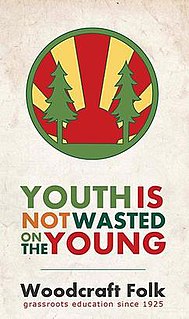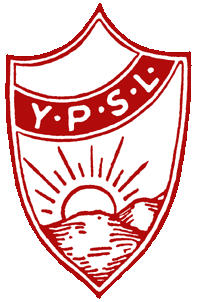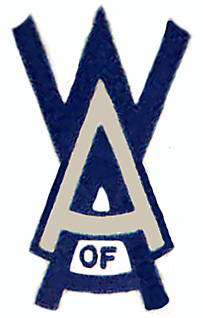
A pioneer movement is an organization for children operated by a communist party. Typically children enter into the organization in elementary school and continue until adolescence. The adolescents then typically join the Young Communist League. Prior to the 1990s there was a wide cooperation between pioneer and similar movements of about 30 countries, coordinated by the international organization, International Committee of Children's and Adolescents' Movements, founded in 1958, with headquarters in Budapest, Hungary.

Woodcraft Folk is a UK-based educational movement for children and young people. Founded in 1925 and grown by volunteers, it has been a registered charity since 1965 and a registered company limited by guarantee since 2012. The constitutional object of this youth organisation is "to educate and empower young people to be able to participate actively in society, improving their lives and others' through active citizenship."

The Young Communist League USA (YCLUSA) was a communist youth organization in the United States. The stated aim of the League was the development of its members into Communists, through studying Marxism–Leninism and through active participation in the struggles of the American working class. The YCL recognized the Communist Party USA as the party for socialism in the United States and operated as the Party's youth wing. Although the name of the group changed a number of times during its existence, its origins trace back to 1920, shortly after the establishment of the first communist parties in the United States.

Charles Emil Ruthenberg was an American Marxist politician and a founder and head of the Communist Party USA (CPUSA).
The Young People's Socialist League (YPSL), founded in 1989, is the official youth arm of the Socialist Party USA. The group comprises party members under the age of 30.

The Socialist Propaganda League of America (SPLA) was established in 1915, apparently by C.W. Fitzgerald of Beverly, Massachusetts. The group was a membership organization established within the ranks of the Socialist Party of America and is best remembered as direct lineal antecedent of the Left Wing Section of the Socialist Party and its governing National Council — the forerunner of the American Communist movement.

Socialist Sunday Schools (SSS) were set up as an alternative to Christian Sunday Schools in the United Kingdom, and later the United States. They arose in response to a feeling as to the inadequacy of the orthodox Sunday Schools as a training ground for the children of socialists and of the need for some organised and systematic method of presenting the socialist point of view and of teaching the ideals and principles of socialism to the children, youths and maidens in the country.

The International Falcon Movement – Socialist Educational International (IFM-SEI) is an international non-profit organisation based in Belgium that campaigns for children's rights. It is a fraternal organisation of Socialist International and works closely with International Union of Socialist Youth (IUSY) and Young European Socialists. IFM-SEI is a full member of the European Youth Forum (YFJ) which operates within the Council of Europe and European Union area and works closely with both these bodies. In Latin-America it is a full member of the Foro Latin-America de Juventud (FLAJ). It is also part of the International Coordination Meeting of Youth Organisations (ICMYO) which consists of worldwide active youth organisations and regional youth platforms coordinating their activities towards the UN and its agencies.

Albert Weisbord (1900–1977) was an American political activist and union organizer. He is best remembered, along his wife Vera Buch, as one of the primary union organizers of the seminal 1926 Passaic Textile Strike and as the founder of a small Trotskyist political organization of the 1930s called the Communist League of Struggle.
The Socialist Youth League was the youth group affiliated with the Workers Party, a splinter Trotskyist party led by Max Shachtman. The parent group changed its name to the Independent Socialist League in 1950. In February 1954, the Socialist Youth League merged with a faction of the Young People's Socialist League and changed its name to Young Socialist League. The YSL merged with a later incarnation of the YPSL in August 1958, around the same time that the ISL was merging into that group's parent body the Socialist Party - Social Democratic Federation.
Non-aligned Scouting organizations is a term used by the World Organization of the Scout Movement (WOSM), World Association of Girl Guides and Girl Scouts (WAGGGS) and their member national organizations to refer to Scouting organizations that are not affiliated with them. See List of non-aligned Scouting organizations.

The Socialist Party of Oregon (SPO) is the name of three closely related organizations — an Oregon state affiliate of the Social Democratic Party of America established in 1897 and continuing into the 1950s, as well as the Oregon state affiliate of the Socialist Party USA from 1992 to 1999.

The International Association of Red Sports and Gymnastics Associations, commonly known as Red Sport International (RSI) or Sportintern was a Comintern-supported international sports organization established in July 1921. The RSI was established in an effort to form a rival organization to already existing "bourgeois" and social democratic international sporting groups. The RSI was part of a physical culture movement in Soviet Russia linked to the physical training of young people prior to their enlistment in the military. The RSI held 3 summer games and 1 winter games called "Spartakiad" in competition with the Olympic games of the International Olympic Committee before being dissolved in 1937.

William F. "Bill" Kruse (1894–1979) was an important head of the Young People's Socialist League (YPSL) in the 1910s. He was a member of the Socialist Party of America until 1921, acting as a leader of the party's Left Wing faction, loyal to the Third International (Comintern). Thereafter he joined the Workers Party of America, serving as Assistant Executive Secretary of the WPA from the time of its foundation in December 1921.
The Finnish Socialist Federation was a language federation of the Socialist Party of America which united Finnish language-speaking immigrants in the United States in a national organization designed to conduct propaganda and education for socialism among their community.

The Militant faction was an organized grouping of Marxists in the Socialist Party of America (SPA) who sought to steer that organization from its orientation towards electoral politics and towards direct action and revolutionary socialism. The faction emerged during 1930 and 1931 and achieved practical control of the organization in 1934. The existence of the "Militants" and the threat they represented to the political line of the SPA caused traditional electorally oriented members to form an organized grouping of their own, known as the "Old Guard faction." In 1935 the personal and political friction between these two basic tendencies lead to an organizational split, with the Old Guard faction leaving to establish the Social Democratic Federation (SDF). The Militant faction itself shattered in the aftermath of the 1935 party split with only a small core loyal to perennial Presidential candidate Norman Thomas remaining in the organization by the coming of World War II.

The Young People's Socialist League (YPSL), founded in 1907, was the official youth arm of the Socialist Party of America. Its political activities tend to concentrate on increasing the voter turnout of young democratic socialists and social democrats affecting the issues impacting that demographic group.
Hal Draper was an American socialist activist and author who played a significant role in the Berkeley, California Free Speech Movement. He is known for his extensive scholarship on the history and meaning of the thought of Karl Marx.
The Socialist Workers Party (SWP) is known as a communist party in the United States. Originally a group in the Communist Party USA that supported Leon Trotsky against Soviet leader Joseph Stalin, it places a priority on "solidarity work" to aid strikes and is strongly supportive of Cuba. The SWP publishes The Militant, a weekly newspaper that dates back to 1928. It also maintains Pathfinder Press.

The Workers Alliance of America (WAA) was a Popular Front era political organization established in March 1935 in the United States which united several efforts to mobilize unemployed workers under a single banner. Founded by the Socialist Party of America (SPA), the Workers Alliance was later joined by the Unemployed Councils of the USA, a mass organization of the Communist Party USA (CPUSA), and by the National Unemployed Leagues originating with A.J. Muste's Conference for Progressive Labor Action (CPLA) and successor organizations.